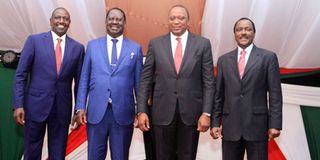Let's preach tolerance, not unity

From left: Deputy President William Ruto, ODM leader Raila Odinga, President Uhuru Kenyatta and Wiper leader Kalonzo Musyoka at a past event in Nairobi .
What you need to know:
- We cannot unite simply because we speak the same language or live in the same neighbourhood; unity is much deeper than that.
- The wealth gap is ever widening between the ruling class and wananchi.
I like the idea of unity, being one in mind and spirit, pulling in the same direction, coming together for a common goal, like in the words of the national anthem.
It is sentimental, romantic, ideal, even spiritual. It would be amazing if it actually happened but it’s just not our reality as Kenyans.
It's where we wish we could be but not where we are. There are no signs of getting there anytime soon, and that’s okay, because we don’t have to.
I grew up in a diverse corner of a village in Trans Nzoia County not too far from Kitale town. Diverse tribally. Our neighbours hailed from different tribes and so we grew up with a sense of tribal consciousness that you would not see in other parts of Trans Nzoia. Growing up, my best friends were from different tribes.
I admire our village for many things, chief among them is the way people support each other in good and bad times. The village welfare group is vibrant, and you can feel their presence during events. Of course with its fair share of limitations, not every family participating, especially the newcomers, but the camaraderie is tangible.
And this is despite the varied languages and backgrounds. We have purposed to come together and stand with each other, a decision by neighbours who see unity as a way to have a cohesive, functional society that they can be proud of.
Same neighbourhood
People tend to unite for a purpose, an idea, a worldview that is compelling enough to them and not just for the sake of it. We cannot unite simply because we speak the same language or live in the same neighbourhood; unity is much deeper than that.
Even families, over time, are held together by ideals such as having common interests, supporting each other, authentic concern for each other’s wellbeing, cords that one can argue tie stronger than blood.
Unity should not just be expected. It is something to be consciously worked towards. Sadly, most of us are not ready to put in the necessary work towards it, even in our smallest circles. For Kenya, we unite around specific short-lived moments and events, not just because we share the same national anthem.
On the day Eliud Kipchoge attempted to become the first man to run a marathon under two hours, the nation rallied behind him.
When terrorists hit Garissa University, Westgate Mall and DusitD2 Hotel, we came together in support of those affected and we spoke in one voice in condemnation of the attackers. Those were unique moments when Kenyans were united.
But it will be naive not to see those moments as isolated. That is not the day-to-day Kenya. That is not our norm. On a normal day, our political, social, economic and ideological differences itch our fingertips.
We are arguing online, on the streets and in burials on almost every issue. There is always a contention to every position, however noble it may seem. We cannot seem to read from the same page on almost everything.
Young people are concerned about their future, seeing fewer and fewer opportunities despite their education and potential. The wealth gap is ever widening between the ruling class and wananchi.
Our differences are just skin deep, and all it takes is a matchstick to light the whole thing up. The reality is that we are nothing close to a united society. Even people who claim to preach unity, especially politicians, do it for their own interests. They will insist on unity, but only in a certain way and through a certain process, the skewed kind of unity only meant for their insatiable appetites.
We all know that they are just loyal to their interests and when the stakes don’t seem to fall on their side, they will change their positions faster than lightning, and fly away to look for a new home for their interests. Since unity is so elusive, and we still want to live in a civilised society, then we need to earnestly think about tolerance.
Political affiliations
You will not always agree with people around you, but you need to live with them, with their contrary political, ideological and social ideas and worldviews. You could decide to be prejudiced, fight every opinion you disagree with, dispute it all but you will just end up alone, miserable and sad, because that’s not how to live.
Tolerance means taking a loss with dignity, it means being able to relate with your neighbour during campaigns despite your differing political affiliations. It means being open minded to accept when you encounter a superior, more compelling argument to yours.
A society can function without unity but it cannot function without tolerance. We don't have to agree to live together, but we have to be tolerant to lead meaningful lives. I also think tolerance is easier to achieve than unity.
As we call for unity, let us realise that it might not be close as we think, and it will certainly not be achieved because it is written in a certain document.
There has to be reason for unity. But tolerance means accepting each other as we are, despite our differences. As Arthur Helps put it, “Tolerance is the only real test of civilisation”.





